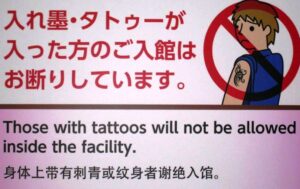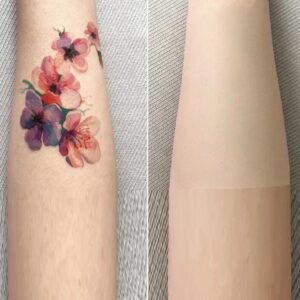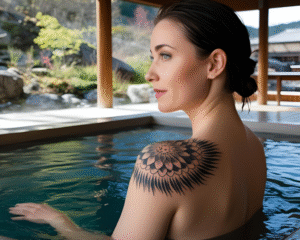
In Japan, tattoos have historically been associated with organized crime (yakuza), and many public baths and hot springs (onsen) still have rules restricting visible tattoos. However, the situation varies widely: some facilities refuse all visible tattoos, some allow small or covered tattoos, and many tourist-oriented onsen now welcome tattooed guests. This guide helps you visit respectfully and confidently.
Before You Go — Research & Booking

-
Check the onsen’s policy online or call ahead. Look for phrases like “tattoo OK,” “tattoo friendly,” or “no tattoos.” If the website is only in Japanese, search for “tattoo” or “刺青 / 入れ墨 (irezumi).”
-
Book a private bath (kashikiri / family bath) if you have large tattoos or want complete privacy — private baths are widely available by the hour.
-
Choose tattoo-friendly onsen: Tourist areas often have English pages noting “tattoo accepted.” Guesthouses and modern resorts are more likely to be flexible.
-
Ask at the front desk on arrival if you’re unsure — be polite and clear.
What To Bring

-
Waterproof tattoo cover sheets / adhesive plasters (large, opaque) — sold at travel stores and online.
-
Waterproof sunblock stickers or liquid bandage (make sure product is suitable for soaking; read instructions).
-
A small wrap or rashguard (thin, quick-dry fabric) for covering shoulder or back tattoos while walking to/from the bath (not to be worn in the water unless the onsen permits).
-
Cash — some private baths or sento charge an extra fee.
-
A towel (small “modesty towel” for walking; a bigger towel for drying after bath).
How to Approach the Reception — Useful Phrases

Use these short phrases at the front desk. Say them calmly and politely.
-
Japanese: 刺青があります。入浴できますか?
Romaji: Irezumi ga arimasu. Nyūyoku dekimasu ka?
English: I have a tattoo. Is bathing allowed? -
Japanese: 家族風呂(貸切風呂)は空いていますか?
Romaji: Kazoku furo (kashikiri furo) wa aite imasu ka?
English: Is a private / family bath available? -
Japanese: この大きさだと入れますか?(カバーできますか?)
Romaji: Kono ōkisa da to hairemasu ka? (Kavā dekimasu ka?)
English: With this size, am I allowed in? (Can it be covered?)
If the Onsen Says “No” — Stay Calm and Polite
-
Respect the rule. Politely thank them (“ありがとうございます”).
-
Ask about alternatives: private baths, times of day when fewer people are present, or a nearby tattoo-friendly facility.
-
Do not argue, remove clothing, or create a scene. A calm reaction makes it easier for staff to suggest an alternative.
How to Cover a Tattoo (If Allowed to Enter When Covered)
-
Use large, opaque adhesive bandages or specialized tattoo cover sheets. Make sure edges are well sealed to prevent peeling in water.
-
For small tattoos: a single waterproof plaster covering the entire tattoo may be enough.
-
For medium/large tattoos: layer multiple sheets or use a combination of waterproof adhesive and a wrap (bandage).
-
Test the cover before entry — run some water over it and gently press to ensure it stays in place.
-
Never use regular adhesive tape (it peels off) or thin decorative stickers that will dissolve.
Note: Even if your tattoo is fully covered, some onsen still refuse entry — covering is not always accepted.
Onsen Etiquette — What to Do Once You’re Allowed In

-
Wash & rinse thoroughly outside the bath. Use the shower area and soap to remove oils and dirt. This is required for everyone.
-
Do not wear swimsuits in the public onsen unless explicitly allowed. A small “modesty towel” is used for walking but must not enter the water.
-
Keep your towel out of the water. Place it on your head or beside the bath.
-
No loud talking, splashing, or photography. Respect other guests’ privacy.
-
Tie up long hair and remove jewelry that may rust or fall off.
-
Limit soak time if you feel dizzy; enter slowly to acclimate to the temperature.
Alternatives if Public Onsen Isn’t an Option

-
Private / family onsen (kashikiri): Book by the hour; perfect for tattooed guests.
-
Hotel room onsen or private rotenburo (outdoor bath): Many ryokan and hotels offer private baths.
-
Tattoo-friendly sento / baths: Some urban sento explicitly welcome tattoos — search “tattoo friendly onsen Japan.”
-
Rental options: Some towns rent private onsen rooms or have hourly-only baths ideal for privacy.
Special Cases & Tips
-
Small cosmetic or medical tattoos: Explain briefly at reception; policies vary and some staff will accept medical reasons.
-
Temporary or henna tattoos: Still treated as tattoos by many facilities — check first.
-
Face and neck tattoos: These are highly visible and more likely to be refused; private options are recommended.
-
Language help: If staff don’t speak English, show photos of your tattoo and a short printed guide (“I have a tattoo — is it ok?”) in Japanese. This reduces misunderstanding.
Sample Short Script for Reception (Printable)

“I have a tattoo on my [shoulder/back/arm]. Can I enter the public bath if I cover it?”
— Japanese: 私は[肩/背中/腕]に刺青があります。隠せば入浴できますか?
— Romaji: Watashi wa [kata/senaka/ude] ni irezumi ga arimasu. Kakuseba nyūyoku dekimasu ka?
“If not, do you have a private bath / family bath available?”
— Japanese: もしだめなら、家族風呂はありますか?
— Romaji: Moshi dame nara, kazoku furo wa arimasu ka?
Dos & Don’ts — Quick Checklist
Dos:
-
Do research ahead and be prepared with coverage items.
-
Do ask politely at reception.
-
Do use a private bath when in doubt.
-
Do follow standard onsen hygiene rules (wash before entering, keep towel out of water).
Don’ts:
-
Don’t argue or force entry if refused.
-
Don’t swim or wear swimsuits in public onsen unless explicitly permitted.
-
Don’t photograph other guests or take pictures inside changing rooms.
-
Don’t assume because a place allowed one tattooed guest, it will allow others — staff decisions can vary.
Final Notes — Respect & Curiosity

Attending an onsen is as much a cultural experience as a bath. Many Japanese people value the calm, communal nature of bathing culture — rules about tattoos are rooted in history and social comfort. Approaching onsen visits with respect, flexibility, and preparation will let you enjoy the experience while honoring local customs.
Accommodation sites
Agoda